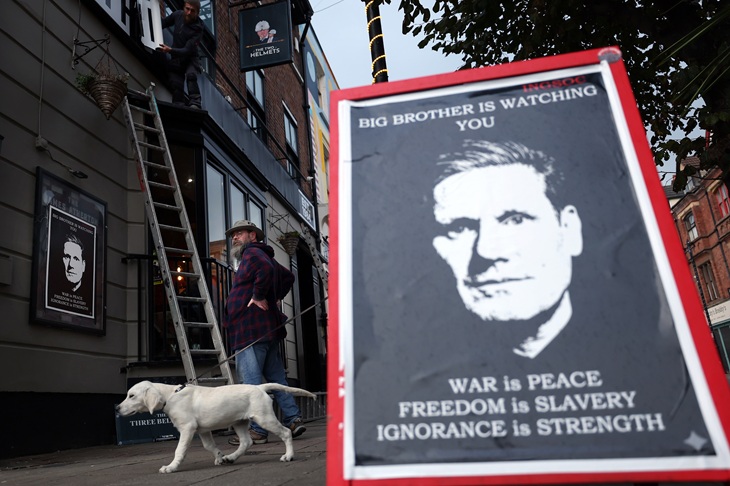
LIVERPOOL, ENGLAND - SEPTEMBER 27:A poster is seen of Britain's Prime Minister Keir Starmer at The Two helmets pub in New Brighton in protest against Labours digital ID policy on September 27, 2025 in Liverpool, England. Labour Conference is being held against a vastly different backdrop to last year when the party had swept to power in a landslide general election victory. A year on and polling shows three quarters of Britons (74-77%) say they have little to no trust in the party on the cost of living, immigration, taxation, managing the economy, representing people like them, or keeping its promises. (Photo by Jeff J Mitchell/Getty Images)
URGENT UPDATE: Britain is under fire as alarming reports surface about the escalating crackdown on online speech. Citizens are increasingly being arrested for causing “anxiety” or posting content deemed offensive. A shocking statistic reveals that nearly 12,000 Britons are arrested each year for “offensive online messages,” raising serious concerns about freedom of expression in the UK.
Recent incidents exemplify this troubling trend. A mother was sentenced to 31 months in prison for a deleted tweet, while a woman battling cancer faced police questioning in her home over a disagreement about her post. In another case, a man was detained in the middle of the night merely for tweeting a meme that said “F*** Hamas.” As these events unfold, the reality of modern Britain appears increasingly Orwellian.
The situation worsened with the introduction of the Online Safety Act, initially presented as a measure to protect children online. Critics argue it now serves as a government-sanctioned license for censorship, blocking content from popular platforms. Notably, videos from SpongeBob SquarePants have been restricted, Spotify playlists censored, and even speeches by elected MPs have been hidden from public view.
In a recent tweet, the official Gov.UK account warned, “Think before you post.” Many interpreted this as a thinly veiled threat, reflecting the government’s tightening grip on free speech. This worrying trend is not limited to ordinary citizens; notable figures like Graham Linehan and Allison Pearson have also faced police scrutiny for their online comments.
The encroachment on personal liberties extends beyond speech. The controversial Brit Card, a mandatory Digital ID, is being promoted as a means to enhance efficiency and combat illegal working. However, critics argue that it is a tool for increased government control. Once implemented, it could become essential for employment, healthcare, and even purchasing alcohol, effectively monitoring every aspect of citizens’ lives.
This push for surveillance comes from a government with a dubious track record on data security, including lost laptops and mishandled information. Citizens are being asked to trust officials who have previously demonstrated a lack of competence in safeguarding sensitive data.
As the government continues to impose restrictions, it is also moving into public health regulation. New rules at Nando’s limit customers to one glass of full-fat Coca-Cola, while Wetherspoons has stopped offering refillable hot chocolate. These measures reflect an alarming trend toward micromanaging personal choices and behaviors.
In just a matter of months, Britain has shifted from being a beacon of democracy to a nation increasingly resembling authoritarian regimes. Citizens face the threat of arrest for memes, censorship of opinions, and the looming reality of constant surveillance through Digital IDs—all under the guise of safety and progress.
As these developments unfold, the urgency for public discourse and action grows. The question remains: How far will the government go in its quest to regulate thought, speech, and even consumption? The implications for personal freedom and civil liberties in Britain are profound and demand immediate attention.
Stay tuned for updates as this situation continues to evolve.






